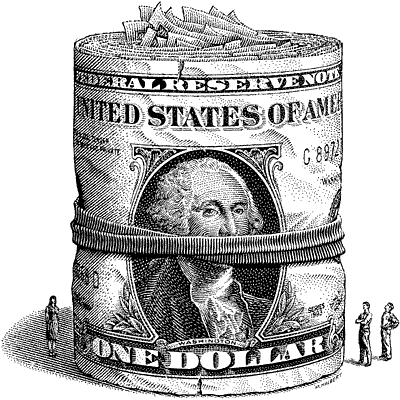|
In Defense Of Global Economy, And Loses What the out of touch `leaders' of the global economy imagined in their glass towers would be three days of high-powered talks bringing together in Melbourne some of names of the Asian-Pacific region turned out to be instead the world's media witnessing a World Economic Forum descent into violence as anti-capitalist demonstrators clashed with police. The success of demonstrations last November in Seattle scuppering WTO talks has given new life to street protest - many of whom had rallied to the anti-capitalist cause via websites which sprung up from the demonstrations against the World Trade Organisation in Seattle. At least eight people were taken to hospital as protesters tried to prevent delegates entering the Crown casino. Police reported that there were 1,500 demonstrators, although the organisers claimed nearer 10,000. Western Australia's right-wing prime minister, Richard Court, was stranded in his vehicle for 20 minutes as protesters daubed it with paint and let down the tyres, while Aboriginal activists "arrested" Mr Court for supporting mandatory sentencing, which leads to the jailing of people in Australia for petty crime. Mr Court was forced to turn back after 50 baton-charging police officers failed to dislodge the protesters' barricades. What is worse for the organisers of the conference is that the demonstrations slowed the WEF's registration programme and reduced the number attending speeches and dinners on the first day of the conference, as up to 200 delegates stayed in their hotel rooms. Observers inside the building reported some of the events were only 50% full. The next stops on the travel itinerary of the global summiteers and the now attendent protesters are the annual meetings of the World Bank and International Monetary Fund in Prague later this month. The chances of a new round of trade negotiations starting by the end of the year have shrunk to zero. The global economy has not worked in its purity for New Zealand and for the vast majority of people world-wide. Sure, industrialisms few super-wealthy benefactors believe absolutely in the current incarnation of economic theory which serves them as religious dogma does the Catholic Church's hierarchy. On the streets the competing dogma is vague enough to capture an ever increasing army of followers united by one thing, anger and a need to apportion blame. The ageless power struggle between owners and ownerless, once taken to the streets will see minor defeats and retreats and strategic law changes, buy-outs for protest leaders etc, etc. The battles will subside and nothing essential will have changed except the spin put on it by historians and other interested parties. Real change? That won't happen on the streets. If people's quality of life is to change then first there will need to be a change in consciousness, in thinking. Thinking is not helped when the head is clubbed. Thinking requires reflection from a position of emotional calm. The sort of thinking found in quiet moments when hearing of individuals like Ghandi, Schumacher (Small Is Beautiful) and here in New Zealand the work of Edmund Hilary in the Himalayas. The thinking that is exchanged using the priceless currency called good-will. Even the infamous Muldoon was an advocate of thinking, of reflection, of doing research. The East so often turned to for inspiration by Westerners has lost its clarity of thought and concern for group cohesion. Next year, the world's most populous country, China, joins the Geneva based WTO. China is opening large parts of its industry to foreign firms, which will cause disruption and `restructuring' all to familiar to Kiwis. There is no political momentum for a new WTO round after the Seattle debacle. The trade agenda is bogged down in Geneva bureaucracy. The WTO New Zealand head, Mike Moore may well be a lame duck who will never see a trade round launched under his watch. The US will soon publish the latest list of EU goods it is targeting for sanctions under long running disputes over bananas and hormone treated beef. The US has been authorised to apply $300m of sanctions by the WTO because the EU's ban on beef and import regime favouring Caribbean bananas contravene global trading rules. But America's decision to rotate the list it targets has been described by EU negotiators as pouring fuel on the fire as it creates uncertainty for a greater group of producers. Battles behind the scenes between the world's trading powers are as heated as the fights outside their summits - and the protesters' anti-trade agenda appears to be getting the upper hand. The WTO is the flagship of the global economy and new economic order, its stranded at port in Geneva and the crew and guests are running for the gangplank. Needless to say few want to go down with a sinking ship and end up on that most frightening of places, the street. But, gloating aside, what can I do? Answer, think not what you can do for the economy nor what the economy can do for you, think what you can do for life and it will reward you with interest. .
|

